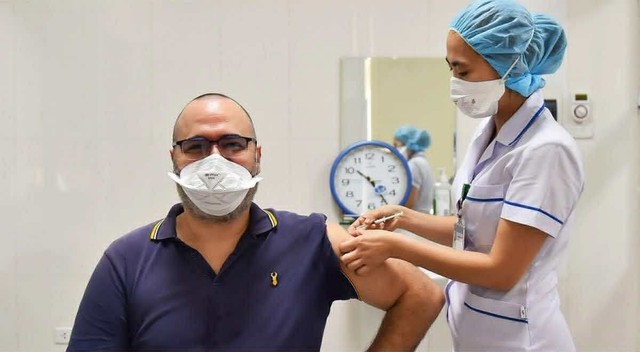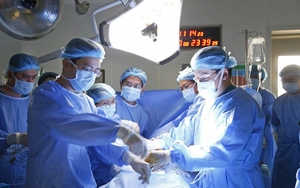
Vietnam health ministry strives to promote medical tourism
Vietnam, long recognized as a safe and welcoming destination, is now expanding beyond leisure travel to develop medical tourism that blends healthcare with cultural and travel experiences.

A file photo by Tuoi Tre (Youth) newspaper shows a foreigner receiving a COVID-19 vaccine shot in Vietnam.
The Ministry of Health is currently seeking feedback on a draft plan to develop high-quality medical services and promote medical tourism during the 2025–30 period.
The first-of-its-kind plan is expected to open up new opportunities, enabling Vietnam’s medical tourism sector to keep pace with global trends and gradually achieve deeper international integration.
A highly-potential market
Speaking with Tuoi Tre (Youth) newspaper, Ha Anh Duc, head of the Department of Medical Service Administration under the Ministry of Health, said Vietnam holds many advantages to develop medical tourism.
“Friendly people, a stable political and social environment, and unique natural landscapes have created strong appeal for international visitors,” Duc said.
“In recent years, the number of tourists to Vietnam, including those seeking medical services, has grown significantly.
“However, compared with other countries in the region, Vietnam still holds a modest position.”
According to Duc, Thailand currently earns around US$6 billion annually from medical tourism.
Singapore, with a land area comparable to Phu Quoc Island, generates between $1.5 billion and $2 billion, while Japan reaches about $4 billion.
In comparison, Vietnam has so far collected only a few hundred million dollars a year, based on incomplete statistics, highlighting a wide gap with its regional peers.
In dentistry alone, preliminary figures show clinics in Ho Chi Minh City generate nearly $150 million each year.
Duc said that if Vietnam fully capitalizes on other potential areas such as cosmetic surgery, in vitro fertilization (IVF), ophthalmology, and medical imaging, the country could raise its annual revenue to several billion U.S. dollars.
According to the Department of Medical Service Administration, Vietnam’s key competitive advantage lies in its affordable costs.
Medical services in the country are priced at only about one-third of those in Thailand and are far lower than in the U.S. or Europe.
“For example, the cost of dental implants in Vietnam is only about one-fifth of that in the U.S.,” he noted.
“Beyond competitive pricing, medical services here are delivered quickly, and many hospitals have mastered advanced techniques, particularly in fields such as cosmetic surgery, fertility treatment, cardiology, ophthalmology, and orthopedics.
“In addition, Vietnam also has a large source of potential clients from its more than 5.3 million overseas Vietnamese, many of whom regularly return to their home country not only for tourism but also for medical services."
Deputy Minister of Health Do Xuan Tuyen also noted that medical services in Vietnam cost only about 30-50 percent of those in countries like Singapore and Thailand, while quality has approached international standards.
This creates a competitive edge in attracting patients from developed countries as well as the overseas Vietnamese community.
Vietnam holds particular strengths in rehabilitation services, traditional medicine, and physiotherapy, supported by abundant medicinal resources.
This represents a distinctive approach to holistic healthcare that many other countries in the region do not possess.
At the same time, Vietnam’s strength in leisure tourism is another major advantage.
With its long coastline, diverse climate, beautiful landscapes, and rich culture and cuisine, the country is well positioned to develop 'leisure and healthcare tourism' packages.
The Ministry of Health and the Ministry of Culture, Sports, and Tourism recently signed a memorandum of understanding to strengthen cross-sector cooperation in developing medical tourism, with the goal of positioning Vietnam as a leading healthcare hub in the region.
Major challenges
Despite its advantages, Vietnam’s medical tourism sector still faces major hurdles, according to head of the Department of Medical Service Administration Ha Anh Duc.
Service quality remains inconsistent and has yet to fully meet international standards, he noted.
At present, Ho Chi Minh City Hematology and Blood Transfusion Hospital is the only public hospital accredited by Joint Commission International (JCI), the world’s leading healthcare quality certification with more than 1,300 criteria.
A few private hospitals have obtained international quality certifications, but the number remains limited, leaving Vietnam’s healthcare system underprepared to compete in the global market.
Medical visa procedures, payment mechanisms, dispute resolution, and insurance policies also pose challenges for international patients.
Deputy Minister Tuyen said the upcoming medical tourism development plan will outline a roadmap and direction to help Vietnam enter the global medical tourism market and compete with regional peers.
The plan will identify key localities and medical facilities, prioritizing major tourist hubs such as Hanoi, Ho Chi Minh City, Da Nang, Khanh Hoa, and Quang Ninh.
Hospitals with strong expertise, infrastructure, and services will be selected to work toward achieving JCI or equivalent international standards.
Efforts will also focus on improving professional quality and services, including upgrading facilities and equipment, establishing dedicated clinics for international patients and high-end clients, and strengthening foreign language training, communication, and international cultural etiquette among medical staff.
Next is aiming to develop comprehensive medical – tourism – wellness packages such as advanced treatment packages for organ transplants, oncology, cardiology, orthopedics, cosmetic surgery; traditional medicine combined with wellness retreats; and holistic healthcare programs.
Partnerships with travel companies, hotels, and airlines will help deliver all-in-one services.
International cooperation, brand promotion, training, technology transfer, and links with global health insurance providers are also seen as vital to the strategy.
According to Tuyen, once approved, the plan will serve as a foundation for rolling out these measures in a coordinated manner, with the goal of establishing international-standard medical centers at major tourist destinations.
This is expected to enhance the standing of Vietnam’s healthcare sector while fostering the effective and sustainable growth of medical tourism, he added.
Duong Lieu - Dong Nguyen / Tuoi Tre News
Link nội dung: https://news.tuoitre.vn/vietnam-health-ministry-strives-to-promote-medical-tourism-103251001111338295.htm


